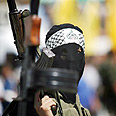
Hamas holding its fire, for now
צילום: איי פי
War on the horizon
Mark your calendars: Israel, Hamas on a collision course
While Israelis occupy themselves with the coming election campaign and the never-ending discussion about "just what is Yitzhak Rabin's legacy," preparations are being completed for the next round of Israel-Palestinian violence.
The coming war has no rating as of yet. Reports of targeted assassinations of Hamas members are barely newsworthy, and there are few reports at all about the Palestinians' difficult situation.
But to any Israeli with eyes in his head, it is clear: If there is no real change – and there is no sign of public pressure to suggest one is in the works – the explosion is sure to come. We even know the date.
Latest killing
Monday, Amjad Hanawi, described as the "leader of Hamas in Nablus," was killed. Following his death, the Shin Bet released material detailing his involvement in terrorist attacks from a decade ago.
Lt. Col. Yuval Bazak, commander of the IDF Samaria Brigade, said the unit headed by Hanawi was responsible for "increasing capacity (for terror attacks) and gathering intelligence."
And so Hanawi became the latest Hamas member to be killed or arrested in recent weeks.
No Israeli, including policy makers, has information to contradict that released by the security establishment, so let's take it for what it's worth: Hanawi was, without question, a bad guy.
Just what capacity or intelligence Hanawi was working on, we don't know. What we do know, however, is exactly what the politicians know: That despite promises of retribution, Hamas is unlikely to respond to this event, just as it has refrained from responding in most previous instances.
The reason has nothing to do, in contrast to the views of most Israelis, with the (very high) ability of the IDF and Shin Bet to carry out targeted killings. Rather, it has to do with something entirely different.
Maintaining quiet
Hamas is a highly-disciplined organization. It has a clear interest at the moment in keeping the military genie in its bottle.
Until the Palestinians hold parliamentary elections in less than two months, Hamas will continue to battle for legitimacy and will avoid action that would re-ignite the conflict.
Israel, predictably, reads this interest - which, more than anything, was responsible for the calm that reigned during the disengagement – as license to kill.
Our traditional approach measures assassinations by one yardstick alone: Can we carry them out without immediate payback. If so, no one asks the greater questions about the cost-benefit of such action.
At the same time, Israel has taken clear steps to scuttle Hamas' participation in the Palestinian elections.
Unlearned lessons
The recent past should have taught us that our actions usually have no effect – the mayor of Ramallah, elected earlier this year, is a Hamas member currently sitting in an Israeli jail – and often serve to strengthen popular support for Hamas amongst Palestinians.
But Israel continues to forcibly try to get involved in Palestinian elections. And despite the assertions of senor IDF officers that the Palestinians have indeed taken real steps to fight terror, Israel continues to act stingily and dismissive with regard to the government of Mahmoud Abbas.
The result of all this is clear: In January, save for some sort of miracle, Hamas is expected to do very well in the elections. Afterwards, the organization will try to realize its power, and if it encounters opposition it will try to realize the retribution it has been promising for months.
If so, then the path to conflict is clearly defined and smoothly paved.
The truly amazing thing in all this is that every Israeli and Palestinian knows this, but we all continue along the path, as if we have no choice.










